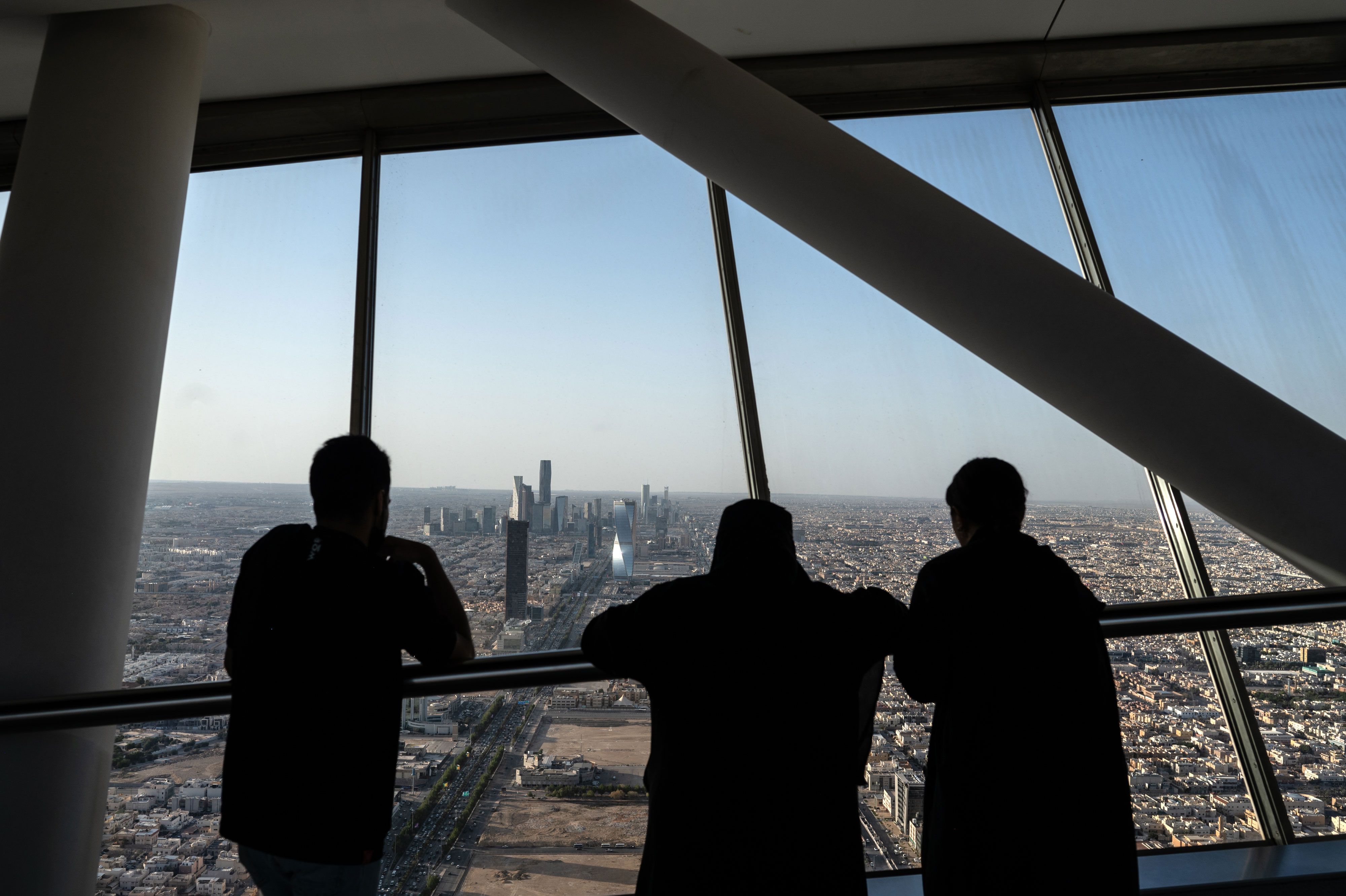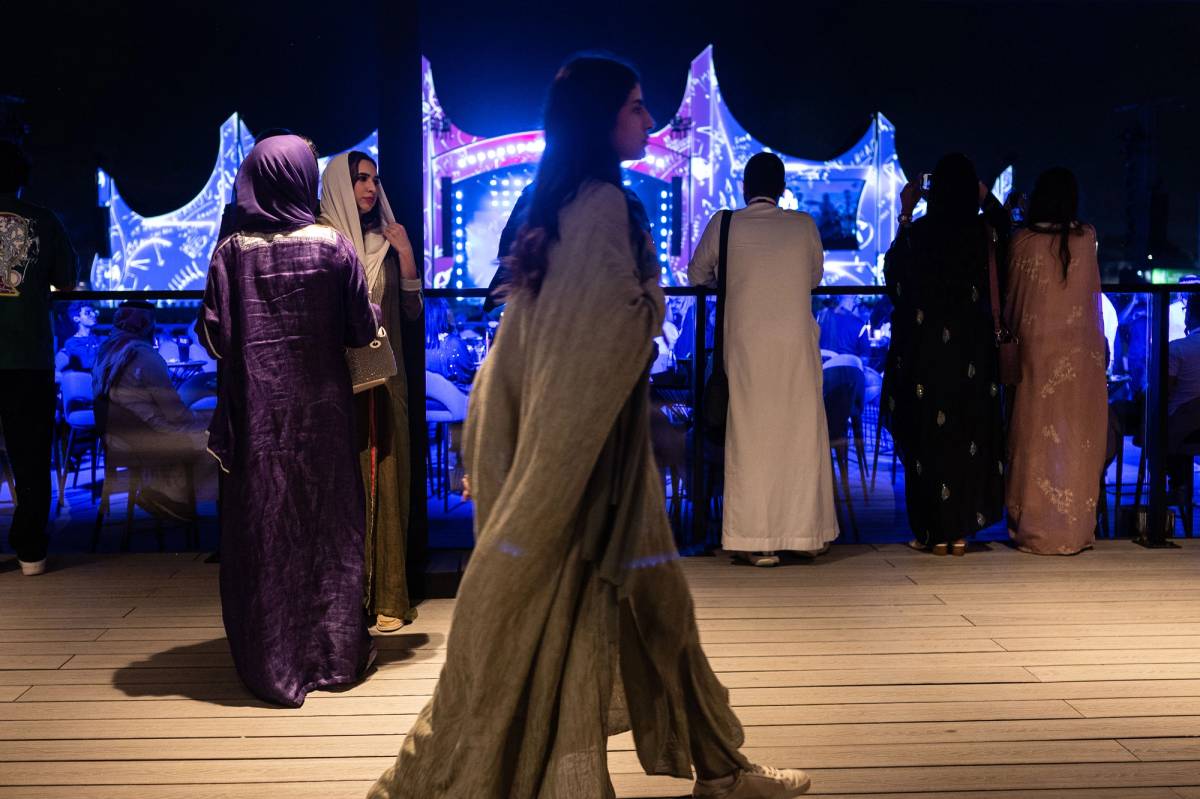A Man With No Name Revisits the Kingdom
A portrait of life in the heart of America’s military empire, where the work of perpetuating the ‘liberal world order’ can be seen up close



After another evening of sweeping rooms at the Ritz-Carlton for bombs, I was driving back through the busy Malaz district of Riyadh when I saw a small girl, no more than 4 or 5, maimed in a traffic accident. I’d noticed her a few moments before it happened in the backseat of a white sedan. She’d been climbing over a woman’s shoulders toward the rear windshield of the car, giggling and unfastened, rocking back and forth.
The sedan had cut us off before swerving into the adjacent lane of oncoming traffic. To avoid an approaching vehicle, it swerved back into our lane but started drifting, first ahead of us and then toward a concrete barrier. The driver spun the car the other way around to avoid it, but the barrier caught the rear of his car. The girl, I believe, was thrown from an open window. From a car stopped several feet ahead of the crash, peering out the window to look behind, I could see her tangled and motionless body on the pavement. Judging by the nature of the driver’s reaction, he was her father.
The woman in the backseat of the sedan, I assume the mother, got out. She wore a black niqab and black gloves, and as she stumbled out of the car and got down close to the girl’s body she gave a long, breathless shriek, like a train rounding a sharp corner. The father started yelling and waving his arms at a group of men standing outside a pharmacy just beyond the concrete barrier. I don’t speak Arabic, but I gathered from the fact that these men didn’t run to help but instead yelled back at him angrily that the father was blaming them, in his madness, for the location of the barrier. At once, dozens of backed-up drivers too far away from the accident to see what happened started honking.
I was in the car with a Navy dog handler and his bomb-sniffing German shepherd. I was a bomb technician at the time and the leader of our little team, which was on its way back to base after having cleared a series of rooms at the Ritz of explosive threats—work that consisted mainly of turning on light switches and faucets and jumping on beds, so that any booby traps would kill us and the dog, rather than the important officials who would use the rooms afterward.
After a frenetic exchange, the sailor and I both guessed, by the indecisive and panicked mannerisms of the gathering bystanders—one man kept wiping the length of his face, as if washing off a cold shower of disbelief—that the girl was unconscious or dead. There wasn’t even a distant siren of the Saudi police, and the scene of the accident—the unmoving girl, the raving father, the screaming mother, the rattled onlookers, the drone of horns—was assuming an air of chaos.
It was a long time before I understood that I wanted to get out of the car and help the girl as badly as I did because by then I’d reached an inhuman degree of apathy during my time in Saudi Arabia, and this whole thing, by contrast, was invested with nerve and spectacle. Here was a badly hurt child, and we had to be the only people around with a first-aid kit in the trunk and a basic competency in emergency medicine. From where we stood we could see no blood, but maybe she did need some kind of trauma dressing or help breathing, or perhaps people would try to move her in such a way that would threaten her life and we could stop them.
And yet there we were, in our jeans and baseball caps and preposterous haircuts, in a Chevy Tahoe with a German shepherd in a cage, a bag of tools and U.S. tourist passports, at the scene of a private tragedy—strangers in someone else’s desert, and no longer out of sight, which is where we were meant to be. The girl’s father was clearly not in his right mind and looking for someone to blame. The police would eventually come.
“Are they actually going to care, if we’re just helping?” the sailor next to me asked. What he meant was: “If something goes wrong, and we get blamed, will anyone be able to bail us out?”
Without exchanging any other words, we motioned our heads in agreement, rolled up the window, and drove away.
It was around the time Crown Prince Muhammad bin Nayef was deposed, and Mohammed bin Salman was made heir presumptive to the throne, that I was living in secret in Saudi Arabia. I was stationed on a small military base we called the Hamlet, which was overseen by the Saudi Ministry of Interior. We were there under the auspices of the government, in other words, as Americans have been for 70 years. But unlike Germany, Japan, Djibouti, and a hundred other countries, Saudi Arabia has never signed a Status of Forces Agreement with the United States—which is how it became the only place I’d ever been expected to conceal not just my identity or location but the fact of my existence.
Starting in the 1950s and continuing through the Gulf and Iraq wars, the House of Saud forged a compromise between the defenders of its security and the guardians of its domestic power: It would authorize American military deployments of varying sizes and evolving mission sets, but would never formally waive legal jurisdiction over U.S. troops by signing an agreement that might imply their permanence. Instead, the Americans would be kept “over the horizon” (i.e., out of sight), where we would have no contact with the people we were meant to be defending, and wouldn’t contaminate the country with our haram habits and behavior. The power of the Wahhabi clergy, and its political alliance with the Saudi royal family, had not yet been broken, and the royal court was likewise eager to obscure any vivid reminders of its existential dependence on “Anglo-Saxons”—another reason to keep the Americans deep in the shadows.
All this was rather frustrating for an American lieutenant nursing fantasies of swashbuckling foreign adventure. If I didn’t quite expect to set off into the desert to win the heart of a tribal leader and back him in a historic revolt before being anointed with some especially fragrant type of incense, I was not yet worldly enough to think I’d be in chinos, T-shirt, and a ball cap, carrying a tourist passport and driving a Chevy Tahoe on my way to disarm minor explosive threats in the ad-Dahna Desert, or hunt for booby traps at the Ritz-Carlton, when I was doing anything at all.
The Hamlet and its high walls were tucked away between a migrant slum and a sewage dump. A nearby foundry, power plant, and plastics factory combined with these attractions to give the little compound an unforgettable stink, and to ward off any outside interest. On the Hamlet’s outer perimeter, which was visible from a nearby civilian road, a uniformed Saudi could usually be seen sitting in a Potemkin guard shack; the call to prayer bellowed into the Hamlet from an adjoining mosque, adding to the illusion that it was just another Saudi garrison. A few meters beyond the southern gate, from the top floor of a tall and otherwise empty office building, Saudi military police kept watch. For Americans in the habit of command—we’d seen and carried ourselves as figures of power and authority to whom deference is owed—it was a stinging indignity to be watched from above like that, less like prisoners than children.
During the many scorching days, when the air was thick with moving dust and made a nasty rasping sound, and an orange fog settled over the Hamlet, we would wait out the sandstorms in hours of petty conversation, feeding each other’s mounting bitterness toward the army, the desert, the miasma of burning sewage and trash. As for the Saudis themselves, we grew to resent them with the kind of intensity that can only come from a total absence of human contact, save for periodic meetings with the military police looking down on us.
During one such meeting in their top-floor office, where we were received with dates, burning agarwood, and every other demonstration of hospitality, I saw an American staff sergeant erupt violently at a Saudi who was with us in the room, speaking on his phone but not participating in the meeting. The man wore a white robe and a sleek earpiece, and from where we sat, we could see him rubbing his bare, calloused feet together, sprinkling little bits of skin on the floor. The staff sergeant told us afterward that he lost his composure when he noticed the man, who was talking on his phone so loudly that it interfered with the meeting, spreading the skin around by making circles on the ground with his toes. The American began yelling hideous racial insults at the barefooted man and had to be restrained. He was quickly disappeared from Saudi Arabia, likely via a cargo night flight to Kuwait. I wish I could say that none of the rest of us shared in his insanity. We all did.

It had been a while since I’d thought of all this, and only a bit more lately since I’d last thought of the little girl, who for all I’ll ever know may have died immediately, or maybe survived her injuries. The memory only reappeared in garish and, no doubt, at least partially unreliable detail a few weeks ago, when I was back in Riyadh for the first time in five years, this time as a civilian—a journalist from a Jewish, pro-Zionist magazine, no less. In an oblique sort of way, it gave me a better glimpse than I would have had otherwise of the changes the kingdom is undergoing now.
I was having dinner at a Café Bateel in the posh Oud Square in Al Safarat, the diplomatic quarter. On the patio of the café there were the usual tables of men and mothers with young kids in full niqabs. There were also groups of young, unaccompanied women, some of them smoking shisha, their hair and many earrings and frighteningly beautiful faces uncovered. Several of the waiters, too, were young women, as were the Uber and Bolt drivers waiting at the entrance to the square. I smoked a cigarette and ordered lox on rye bread.
A few tables away, there was a group of three teenage girls; two were giggling at the other, who was struggling to stifle a big smile. A handsome boy at a different table was smiling too and pretending not to look at her every few seconds. Some kind of atmospheric Arabic folk music alternated with throbbing house music pregnant with the possibility of relief. Lovely children ran around screaming.
Maybe what I’d been expected to do and did, and what I didn’t do, equally didn’t matter. Saudi Arabia had always been moving forward without me, which in truth was all most Saudis ever wanted—and all we wanted, too.
Jeremy Stern is deputy editor of Tablet Magazine.